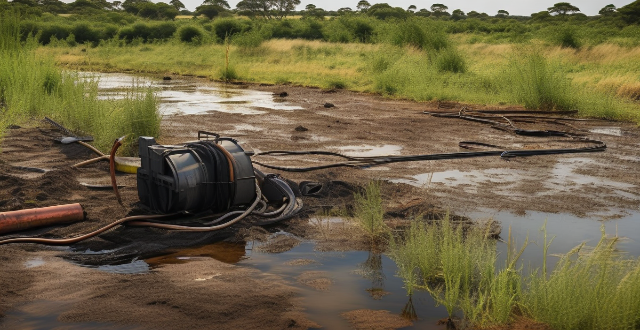The primary causes of water pollution include industrial waste discharge, agricultural runoff, sewage and wastewater disposal, urban runoff, mining activities, and oil spills. To mitigate these causes, strategies such as stricter effluent standards, cleaner production methods, sustainable agriculture practices, improved sewage treatment, urban runoff control, responsible mining practices, and oil spill prevention and response should be implemented.

Primary Causes of Water Pollution
Water pollution is a serious environmental issue that affects the quality of water in our rivers, lakes, and oceans. It can have detrimental effects on human health, wildlife, and ecosystems. The primary causes of water pollution are:
- Industrial Waste Discharge: Industries release toxic chemicals, heavy metals, and other pollutants into water bodies.
- Agricultural Runoff: Fertilizers, pesticides, and herbicides used in farming can contaminate water sources.
- Sewage and Wastewater Disposal: Improper disposal of sewage and wastewater can lead to bacterial and viral contamination of water.
- Urban Runoff: Stormwater runoff from cities carries pollutants like oil, grease, and trash into waterways.
- Mining Activities: Mining operations can release acid mine drainage and heavy metals into nearby water sources.
- Oil Spills: Accidental oil spills from tankers and offshore drilling can severely pollute marine environments.
Mitigation Strategies
To mitigate these causes of water pollution, various strategies can be implemented:
Industrial Waste Management
- Implement Stricter Effluent Standards: Governments should establish and enforce stricter regulations on industrial waste discharge.
- Promote Cleaner Production Methods: Encourage industries to adopt cleaner production techniques that reduce waste generation.
- Support Wastewater Treatment Facilities: Invest in modern wastewater treatment facilities to effectively remove pollutants before discharge.
Sustainable Agriculture Practices
- Integrated Pest Management (IPM): Promote IPM to reduce reliance on chemical pesticides.
- Precision Farming: Use precision farming techniques to minimize fertilizer and pesticide use.
- Buffer Zones: Create buffer zones between agricultural land and waterways to filter out pollutants.
Improved Sewage Treatment
- Upgrade Sewage Treatment Plants: Modernize sewage treatment plants to enhance their capacity and efficiency.
- Promote Decentralized Wastewater Systems: Encourage the use of decentralized systems like septic tanks and constructed wetlands for small communities.
- Rainwater Harvesting: Implement rainwater harvesting systems to reduce the burden on sewage systems during storm events.
Urban Runoff Control
- Green Infrastructure: Develop green infrastructure like permeable pavements and rain gardens to manage stormwater runoff.
- Stormwater Management Plans: Implement comprehensive stormwater management plans in urban areas.
- Public Awareness Campaigns: Conduct public awareness campaigns about the proper disposal of hazardous waste and litter.
Responsible Mining Practices
- Mine Site Rehabilitation: Ensure that mining companies rehabilitate mine sites after closure to prevent acid mine drainage.
- Regulatory Oversight: Strengthen regulatory oversight of mining activities to minimize environmental impacts.
- Research and Development: Invest in research and development for cleaner mining technologies.
Oil Spill Prevention and Response
- Double Hull Tankers: Mandate the use of double hull tankers to reduce the risk of oil spills.
- Emergency Response Plans: Have robust emergency response plans in place for rapid cleanup after oil spills.
- Regular Maintenance Checks: Enforce regular maintenance checks on oil extraction equipment to prevent leaks and spills.
By addressing these primary causes of water pollution through comprehensive strategies, we can work towards cleaner waterways and a healthier environment for all living beings.